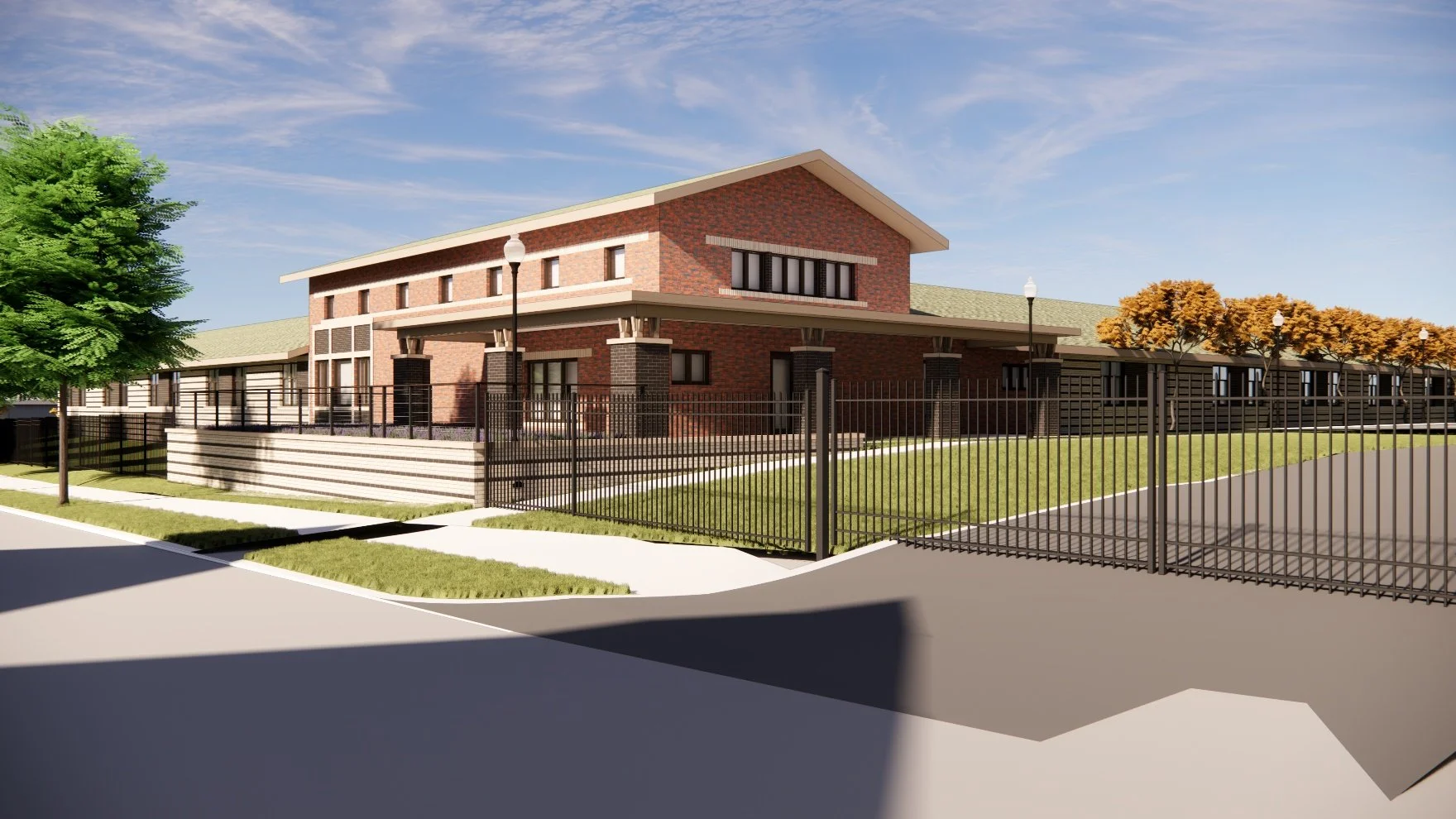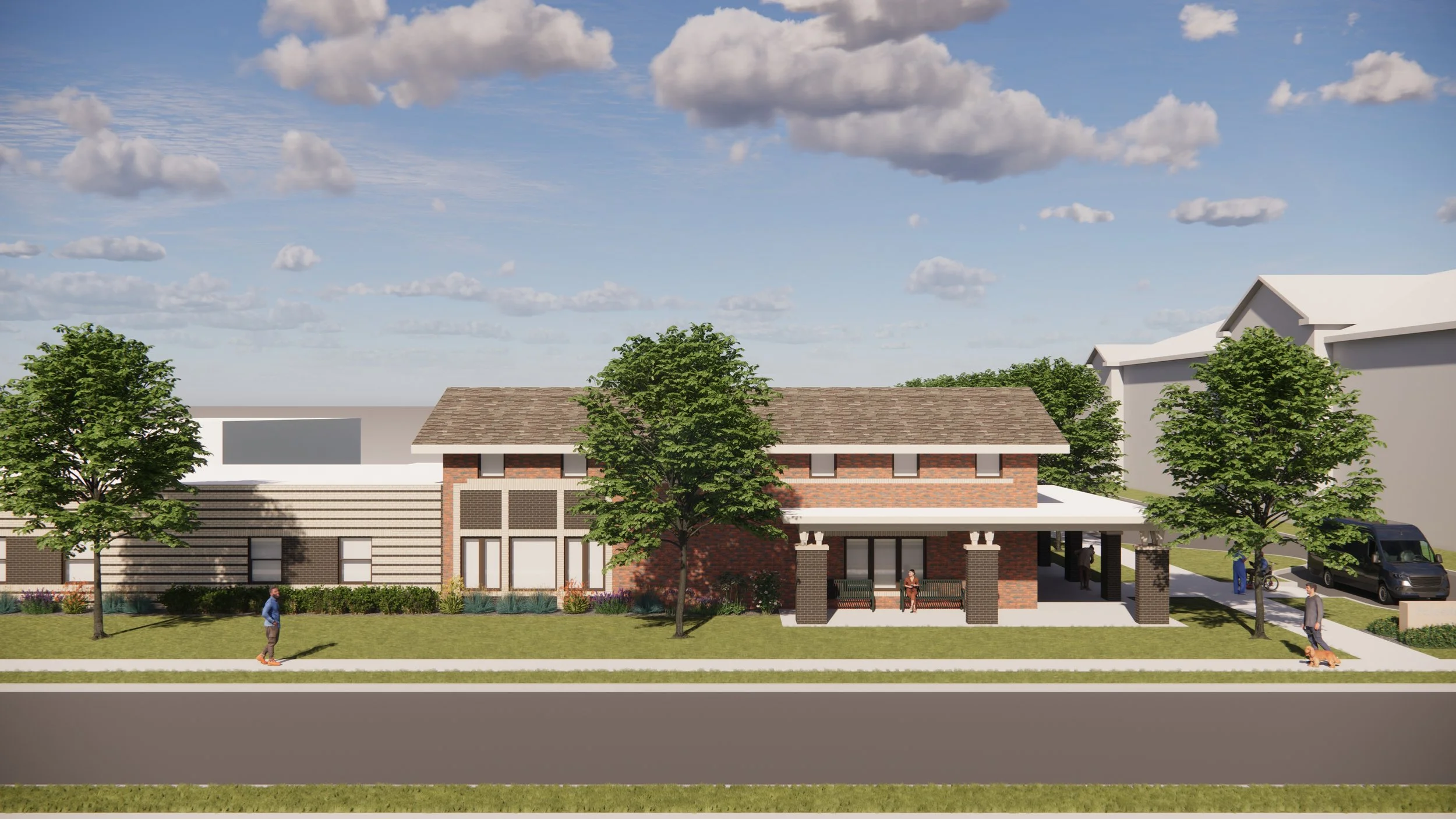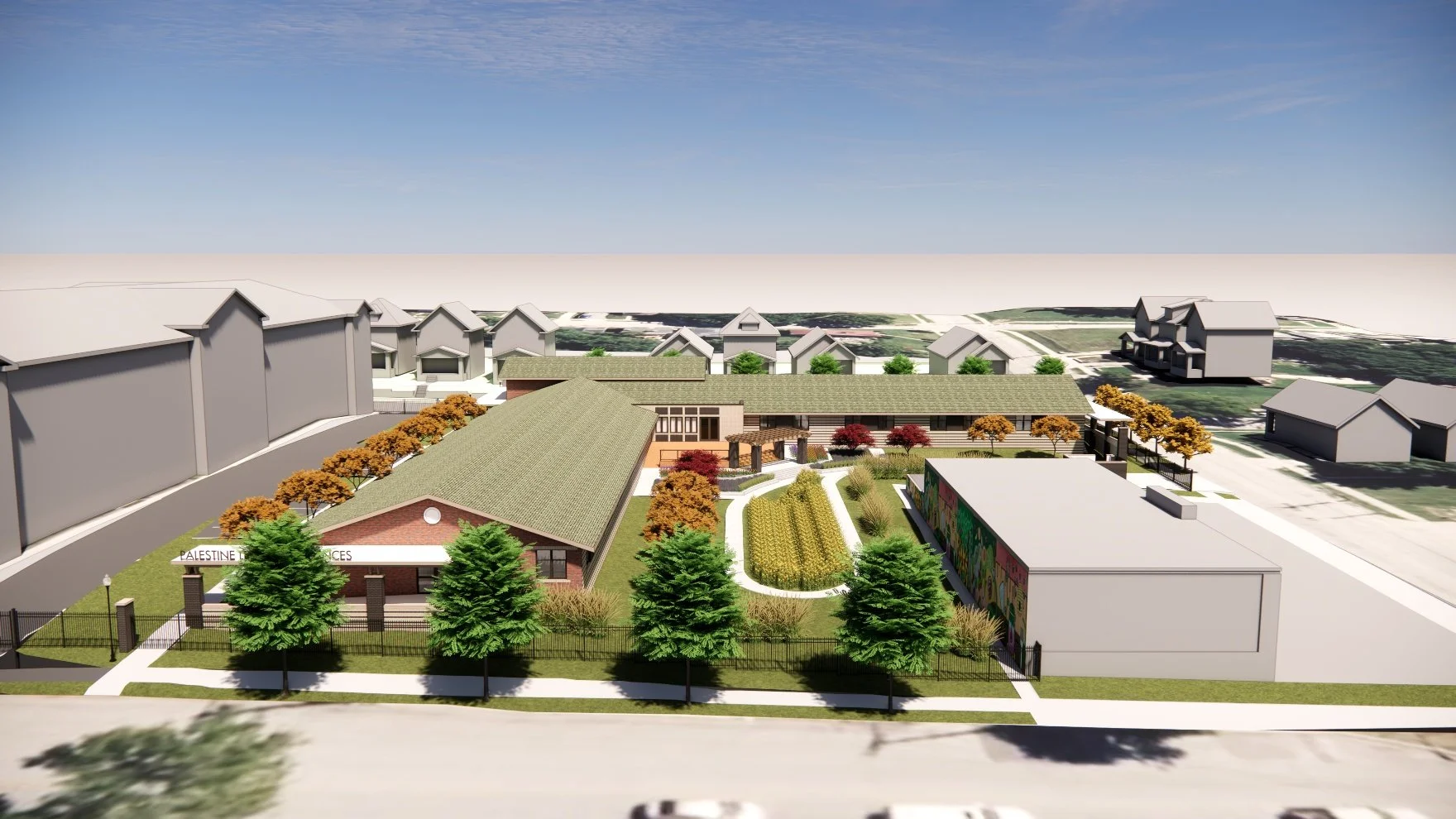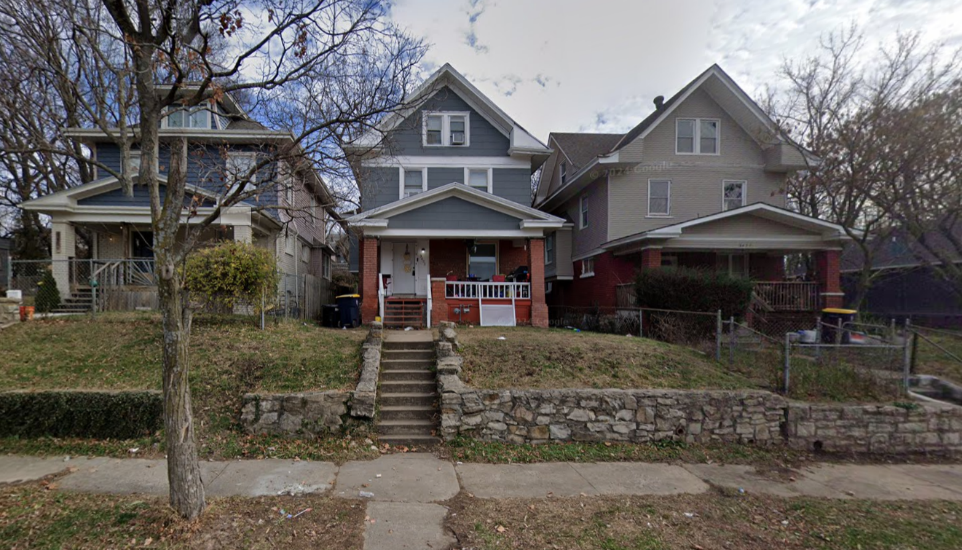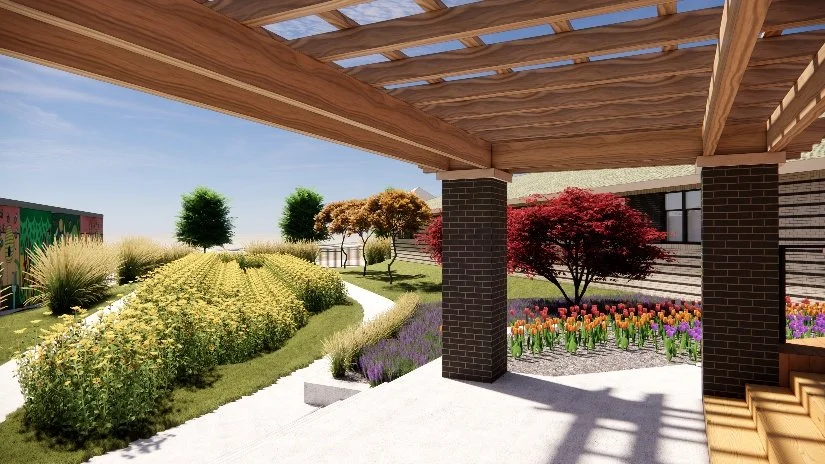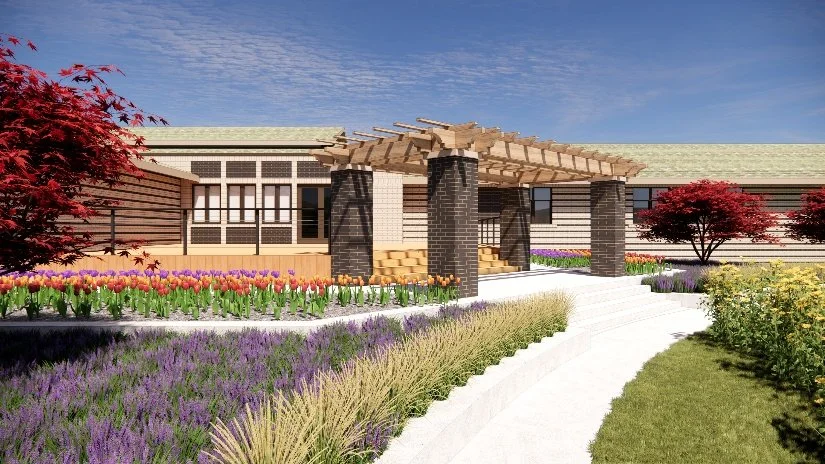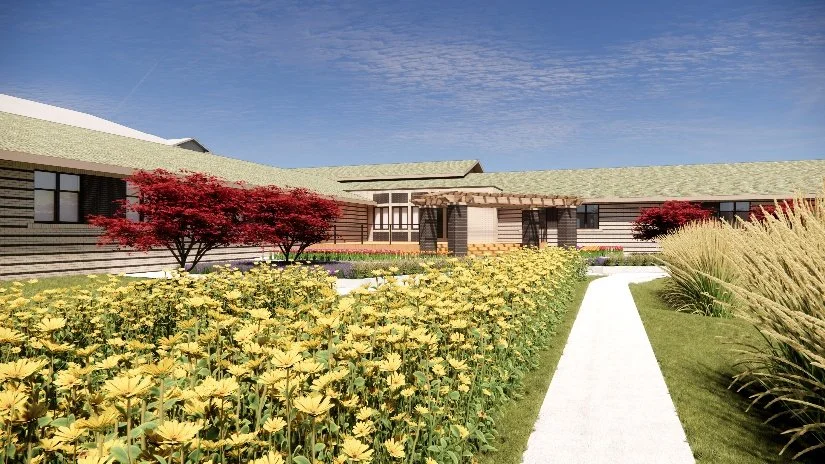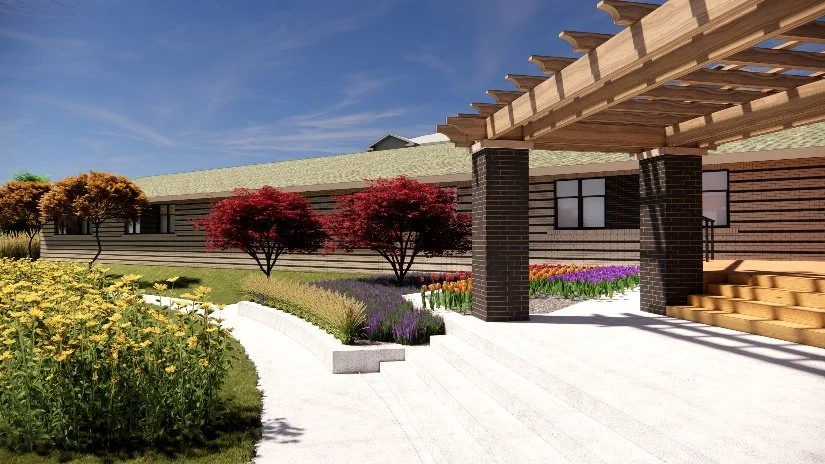Palestine Legacy
Residences
Project Overview
The 187 affordable senior apartments include Palestine Gardens (PG), Palestine Gardens North (PGN), and Palestine Commons. PG and PGN provide 118 studio and one-bedroom apartments for low and very-low-income seniors over 62 years of age. Resident rents cannot exceed 30% of adjusted household income. This limitation and project-based federal Housing Choice Vouchers allow PG and PGN to provide decent, safe, and affordable housing to very-low-income seniors (the majority under 30% of AMI), some of whom pay no rent based on their income level.
Palestine Commons, immediately to the north of the Palestine Legacy Residences site, has 69 one and two-bedroom apartments for low-income (below 60% of AMI) seniors over 55 years of age. Although established rents at PC are higher than PG/PGN, 40 residents (58%) have tenant-based HCVs and pay rents based on the 30% income limitation. The new facility will be a 39-bed, not-for-profit assisted living facility serving the residents of a very-low-income community in central Kansas City, Missouri. The development site for PLR lies within Jackson County Census Tract 56.01. Along with 14 adjacent Census Tracts, 56.01 is a Persistent Poverty Census Tract where a poverty rate of 20% or more has existed for more than 30 years.
PEDC History
For over 60 years, Palestine Missionary Baptist Church has been an anchor to the central Kansas City neighborhoods that surround it. In addition to the church itself, the affiliate organizations associated with the church, including the Palestine Economic Development Corporation (PEDC) have invested over $35 million in affordable senior housing and the Palestine Senior Activity Center.
Mission and Purpose
Palestine Legacy Residences will continue the Palestine Village Continuum of Care and Housing as envisioned by the late Reverend Earl Abel, Jr. and serve low-income seniors and others in the heart of central Kansas City. This long-term commitment has allowed seniors to age within the community in a supportive, quality neighborhood setting.
The primary goal of the project is to make modern and decent assisted living care available to limited-income residents of central Kansas City. Modern care facilities, located in suburban Kansas City, charge in the range of $5,500 per month or more- well beyond the affordable range of the PLR targeted population. By limiting debt, PLR proposes to operate with monthly resident charges between $1,800 and $3,500, with an average cost of $2,700 per month. based on income. This will put first-class, conveniently located, assisted living care within reach of many community members and their families. Additional outcomes include:
Creation of 25 new, permanent health-care jobs at a living wage or above.
Elimination of blighted properties and neighborhood nuisances
Extension of the continuum of care provided by the Palestine Village developments allowing senior and other residents to remain in the community and supporting existing businesses and institutions.
Increased use of and support for transit investments including the Prospect MAX BRT line.
The Unmet Need in the Community
The core neighborhoods and communities of central Kansas City, MO suffer from a severe shortage of modern, decent and affordable assisted living and residential care facilities. Seniors and others with this need must choose (if they have a choice) between outdated facilities housed in former single-family homes not designed for care delivery and suburban developments far removed from family, neighbors and the institutions they have participated in all their lives.
In addition, the majority of the more desirable, suburban facilities are financially out of reach for many of these individuals, charging up to $7,000 per month for housing and services. Reliance on limited personal resources, state and federal reimbursements greatly restricts choices and available care options. Over the past 25 years a number of
Federal and State financing programs have created a supply of decent and affordable independent-living senior apartments throughout central Kansas City. This has allowed limited-income, senior households to remain close to their families and support networks without the maintenance and ownership costs of a single-family house. However, these apartment developments report that each year between 5% and 10% of their residents need to seek assisted living residential care in a licensed facility or returning to live with family. For many, leaving their home neighborhood and community is often the only choice. Including the six outdated, and marginal licensed facilities within the area south of the Missouri River to 81st Street and from Broadway to I-435, a recent review demonstrated a need for 51 additional beds in the nine, central-city zip codes service area.
Current Project Status
A number of significant milestone mark PLR’s development progress:
Certificate of Need from State of Missouri
The Missouri Department of Health & Senior Services (DHSS) has oversight of the Missouri Assisted Living market and determines the need for a specific area. The Health Facilities Review Committee granted Palestine Legacy Residences a Certificate of Need (CON) for a new, 39-bed facility.
PEDC Status
PALESTINE ECONOMIC DEVELOPMENT CORPORATION is an established 501-c(3) not for profit development entity as well as a HUD recognized Community Housing Development Corporation (CHODO)Zoning Secured
The PLR project site has been rezoned with an Urban Redevelopment status with the active support of the area neighborhood association.Building Permit Status
Construction Documents have been completed and a Building Permit is in process with Kansas City, Missouri, the jurisdiction having authority for the site.Financing Status
Project development has been advanced with a $2.9mm funding award from the City of Kansas City, Missouri. That initial funding commitment has funded pre-development activities including final design/engineering, site assembly and operational procedures and is the basis, along with philanthropic sources, for leveraging a New Market Tax Credit allocation.
Preliminary Development Cost Sources & Uses
Development Costs
Construction Cost $7,685,912Architecture / Engineering $275,300Construction Loan Fees & Interest $200,000Demolition, Remediation $115,000Market Study, Appraisal, Environ. $50,000Contingency $225,000Legal, Title & Accounting $350,000FF&E $351,000Acquisition (incl. Legal & Fees) $450,000Developer Fee (PEDC) $500,000Project Management $150,000Lease Up & Marketing $75,000Operating Reserve $236,458Replacement Reserve $39,000TOTAL DEVELOPMENT COST $10,702,670Development Financing Sources
PEDC Equity* $400,000PIAC Public Improvements* $315,000Sherman Family Foundation* $250,000Philanthropy $2,598,532Private Debt $2,299,628Central City ED Sales Tax* $2,860,010New Market Tax Credit Equity $1,979,500TOTAL SOURCES $10,702,670* Committed Sources
Market Strategy
Again, core neighborhoods and communities in central Kansas City, MO, face a shortage of modern and affordable assisted living facilities. With the use of unique financing, grants, and subsidies, Palestine Legacy Residences (PLR) will provide modern, assisted living through preventive and proactive care to residents at an affordable rate.
PLR will market to families with seniors in need of assisted living, particularly those from low to middle-income households currently residing in the Kansas City inner city and the immediate surrounding area. The goal is to attract and retain residents by providing new, modern assisted living accommodations at an affordable cost, ultimately achieving 100% occupancy of the 39-bed facility
Target Audience/Demographics
Seniors 65 and older: The targeted audience is comprised of 12,000 seniors over 65 in targeted zip codes.
Data indicates that approximately 1.4% of seniors over 65 reside in assisted living facilities. The average assisted living resident ages are:
13% - age 65 – 74
30% - age 75-85
50% - age 85 and over
Based on recent census data, there are approximately 8,000 seniors over the age of 65 in the targeted Kansas City inner city area, with an additional 4,000 seniors in nearby zip codes that will also be targeted. The current census data for these targeted and additional areas indicate that approximately 2,700 of the 12,000 seniors are over the age of 85. Given the existing facilities in the target area, it is currently underserved by 50-75 beds.
Family Members & Caregivers: Senior care decisions are often made with input and sometimes additional financial support from family members and caregivers. Therefore, our marketing messages will be targeted to include family members and caregivers.
Marketing Strategies
Digital Marketing:
Website: Create a user-friendly website with clear information about services, costs, and contact details.
Social Media: Utilize platforms like Facebook and Instagram to share information about the facility
SEO & SEM: Utilize SEO & SEM content marketing, social media, and email campaigns to run targeted ads to reach family members of prospective residents searching for assisted living solutions
Traditional Marketing: Leverage print ads, direct mail, and community events
Referral Programs: Develop programs to encourage referrals from current residents of independent living and healthcare professionals
Partnerships: Collaborate with local healthcare providers and social workers to generate referrals
Community Outreach: Collaborate with local churches, senior centers, and community organizations within the targeted zip codes to host events
Local Advertising: Create compelling ads that showcase PLR’s amenities
Flyers & Posters: Distribute informational flyers and posters in community centers, grocery stores, and libraries.
Implementation Plan
Month 1
Market Research – ID target Audience- Set Goals
Month 2
Develop Marketing Strategy
Month 3
Confirm Research Data
Surveys: Create surveys for potential residents and their families to gather insights about their needs, preferences, and concerns
Interviews: Conduct interviews with current independent living residents of Palestine Gardens and Palestine Commons to understand their needs and what they value most about PLR
Months 4 & 5
Create Marketing Material (Website, brochures, flyers, set up social media sites)
Month 6
Launch Marketing Campaign – Online & Offline
Online: Website, social media
Offline: Attend health fairs, community events, and employment expos to share information about facility, start ads, distribute informational flyers
Month 6
Monitor and Analyze Campaign results
Month 7
Host Open House with tours - to allow families to tour the facility and meet primary staff
Month 8
Grand Opening – Review Goals – Plan Next Steps
Ongoing Marketing Activities
Blog: Include a blog on facility website covering topics relevant to senior care, such as health tips and assisted living benefits
Newsletters: Send out monthly newsletters to keep families informed and engaged
Referral Program: Implement a referral program to generate 5-10 new referrals per month to develop a prospective resident pipeline
Offer incentives for current residents and their families to refer new residents
Website: Post caregiver tips and resident stories to build trust and credibility
Events: Organize facility events and educational seminars
Occupancy Rate: After receiving DHSS occupancy approval, target to attain 100% occupancy within 6 months and maintain minimum occupancy of 90%
Brand Awareness/Source of Traffic: Leverage existing brand awareness of Palestine independent living to develop and increase PLR brand awareness with website traffic. Survey cards will be completed on new and prospective residents to document the source of traffic. Initial target of 35% of new residents for review of website information
Community Engagement: Develop partnerships with at least 6 local organizations, healthcare providers churches or community centers within the first 3 months of build initiation. Consistently maintain a minimum of 4 partnerships
Staff Turnover: Hire staff and maintain a staff turnover rate of less than 30% that can be used as part of on-going marketing efforts regarding consistent resident care
Resident Satisfaction: Resident satisfaction surveys on resident care, building maintenance, housekeeping, food, and activities to be completed quarterly with a target of 75% or higher overall satisfaction.
Operations & Management
Services Offered
Palestine Legacy Residences (PLR) Assisted living facility will provide a balance between independence and assistance for seniors who need help with daily activities. The services offered will include:
Personal Care: Assistance with activities of daily living (ADLs) such as bathing, dressing, grooming, and toileting.
Health Care Services: Medication management, health monitoring, and coordination of medical care with healthcare professionals.
Meal Services: Nutritious meals and snacks prepared according to dietary needs and preferences.
Housekeeping and Laundry: Regular cleaning of living spaces, laundry services, and maintenance.
Social and Recreational Activities: Organized events, outings, exercise classes, hobbies, and social gatherings to promote engagement and well-being.
Security and Safety: 24-hour staff presence, emergency call systems, and secure environments to ensure residents' safety.
Staffing Model
The staffing model for PLR will ensure residents receive the care and support they need. Here are some key components of the 24-hour staffing for PLR:
Administrator: Responsible for overall management, regulatory compliance, and ensuring the facility runs smoothly.
Nursing Staff: Provides medical care, medication management, and health monitoring. The team will include a full-time Licensed Practical Nurse (LPN) and additional nursing staff. PLR will always have two nursing staff members on-duty. Additional nursing staff members may be any of the following: Certified Nursing Assistants (CNAs), Certified Medication Technicians (CMTs), or Level One Medication Aides (L1MAs).
Personal Care Aides: Assist residents with activities of daily living (ADLs) such as bathing, dressing, grooming, and toileting.
Housekeeping and Maintenance Staff: Ensure the facility is clean, safe, and well-maintained.
Dietary Staff: Includes dietary supervisor and cooks who will prepare and serve nutritious meals according to residents' dietary needs
Activities Coordinator: Plans and organizes social and recreational activities to keep residents engaged and active.
Administrative Support Staff: Handle administrative tasks such as billing, scheduling, and record-keeping as well as welcoming guests and directing incoming calls and inquiries
Security Personnel: Ensure the safety and security of residents and the facility.
Ownership
Palestine Legacy Residences is 100% owned and operated by Palestine Economic Development Corp, a Missouri Non-profit organization dedicated to providing senior living communities for low- and middle-income seniors.
Design & Development Team
Facility Design
Palestine Legacy Residences is designed to be compatible with the architecture of the neighborhood where it is located. With residential characteristics, such as compatible roof design, use of brick and porch structures, the facility design aims to reinforce the Craftsman style of the nearby neighborhood.
An interior courtyard provides a private, protected setting with an available exercise track integrated into a site water management feature. A sheltered terrace provides an available location for outdoor programmed and informal activities
Property Management Approach
Management of the property will be under the direction of a state-licensed Assisted Living Administrator. The property will have on-site maintenance staff to promptly address resident room and property issues, increasing resident-staff collaboration and community cultural awareness.
Development Team
Developer: Palestine Economic Development
Development Consultant: Dromara Development
Operations Consultant: Mother Mary’s Helpers
Architecture & Planning: SCOTT ASSOCIATES

